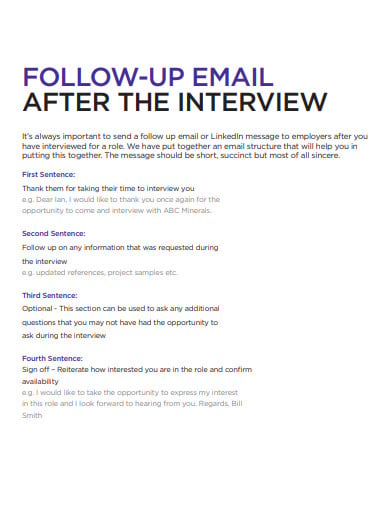
Think about the interviewĪfter learning that you didn't get the job, start to reflect on how your interview went.
#Interview follow up questions how to#
How to ask why you didn't get the jobįollow these steps to professionally ask an employer why you didn't get a job offer: 1. They may be busy finding new ways to increase their revenue and get the business back to normal. Hiring new employees may be low on their list, which is why you may not hear back from them in these situations. The company may not be able to afford your required salary or halted the hiring process altogether due to budget constraints. Related: Tips To Help You Improve Your Interviewing Skills The company has budget constraints It's ideal to choose people you have positive relationships with.

Only ask employers to be your reference if you excelled in your role and left the job on good terms. When choosing a previous employer, think about what they are likely to say about you. When you choose job references, it's important to pick people who you trust to give you high praise.

Explore the company's team page on its website to see how current employees present themselves online. If the job required you to have a large online following, maybe the employer felt like you needed more follower engagement. Likewise, be mindful of what you are commenting on other's posts. When posting online, only share appropriate photos and links.
#Interview follow up questions professional#
That's why it's important to set all of your personal social media accounts to private or make sure to have a professional presence. You can improve your online presenceĪfter the interview, the employer may have checked your online profiles. Also, onboarding existing employees tends to be easier since they know the company's policies and might be familiar with the position already. Hiring internally tends to be a safer bet for employers since they already know the work ethic and personality of their employees. Prior to the hiring process, they may have had this employee in mind but still had to post the job publicly. They went with an internal employeeĮven after interviewing multiple candidates, an employer may decide to give an existing employee a promotion. If you're a qualified candidate, they will be happy to help you follow the directions correctly. If you ever have any questions, make sure to politely ask for some clarification. Whenever an employer reaches out to you, make sure to reread what they send. For example, the employer may have given you specific directions that you found challenging to complete or didn't see. The employer's directions were unclearĪ miscommunication could have led to you not getting the job. Do this by picking out your interview outfit well in advance, getting enough sleep the night before and showing up a few minutes early. If you found it challenging to answer many of the interviewer's questions, this may show that you need to prepare for your next interview more.Īnother part of looking prepared is to appear to be calm and confident. You need to prepare moreĪlthough you should try to give natural responses to interview questions, preparing for your responses can help you feel more confident during an interview. If you're still interested in a similar role, you can continue to build your resume and apply elsewhere. It's likely that your interview went well and you'd be a great fit for the role, but someone may have stood out more based on their qualifications. Someone was slightly more qualifiedĮven if you fulfilled all the requirements on the job application, there may have been another candidate with slightly more experience. Employers often have a specific candidate in mind, so you may have more of a chance by applying to jobs within your expertise. By reflecting on your professional background and skill set, you can begin to apply to jobs that are more relevant to your qualifications. Sometimes an employer sees you as a better fit for a different role but cannot currently give you a job offer. These are some of the most common reasons candidates may not get a job offer: You're better suited for other work

Related: How To Respond to a Job Rejection Email Common reasons for not getting a job In this article, we share common reasons for no job offer and how to ask why you didn't get the job.

One thing to remember is that multiple factors go into the decision-making process, many of which aren't personal. Even if you're a qualified candidate, there are many reasons why an employer might choose to hire someone else. There may be a time in your career when you felt like a job interview went well, yet you didn't get a job offer.


 0 kommentar(er)
0 kommentar(er)
